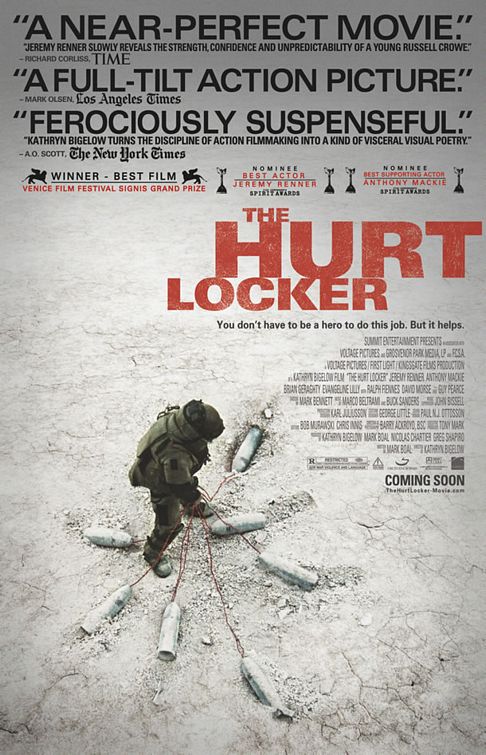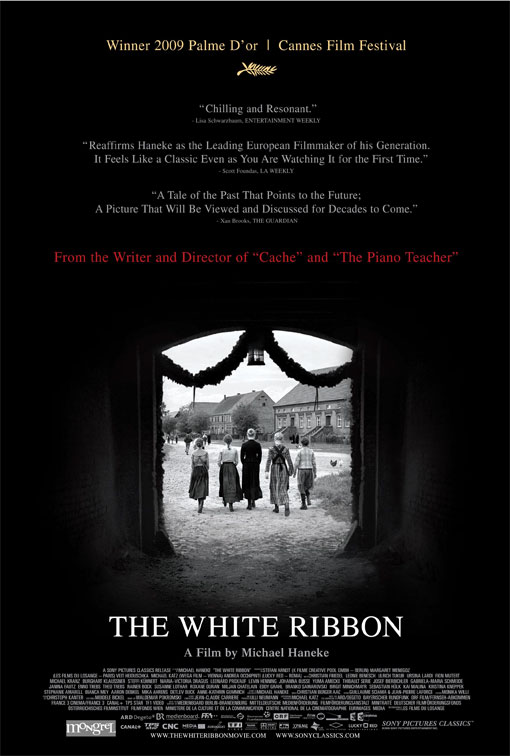 I hope to include more posts about film in general in the future, and not simply limit my writing to reviews. So to begin, I'll cover my current obsession, the films of Lars von Trier.
I hope to include more posts about film in general in the future, and not simply limit my writing to reviews. So to begin, I'll cover my current obsession, the films of Lars von Trier.My introduction to von Trier's work, as mentioned in an earlier post, was with the 2009 art-house horror film Antichrist. I just watched it for the second time, and I'm still convinced that it's an absolute masterpiece. Since initially seeing that film last December, I've seen an additional 4-5 of his films and recently read a biography focusing on his films. I feel I have a much greater understanding not only of his career in general, but specifically Antichrist, which I would undoubtedly place amongst my favorite films.
When I first watched Antichrist, my main complaint was the use of CGI. After the second viewing, this issue didn't bother me so much. Unlike most directors, von Trier really does use CGI as a story-telling tool, not simply something nice to look at (on that note, I'm intrigued by the recent news that Wim Wenders and Werner Herzog will be filming documentaries in 3D, though not necessarily excited). Sure, the fox grunting "Chaos reigns" is over the top, but in the context of the film, it's rather unsettling. And this is the crux of my complaint against Antichrist, the scenes that unsettle create more terror than the scenes that shock.
There are 3 instances of true horror for me in the film, and none of them feature the graphic violence the film is notorious for sporting. In one scene, "He" (Willem Dafoe) is flipping through "She's" (Charlotte Gainsbourg, whose album IRM, which was inspired by her experience on this film is well worth checking out) thesis work, titled "Gynocide". The camera shows the pages as he flips through, with the handwriting descending quickly into unintelligible scribbles by the end of the book.
This scene is genuinely terrifying, and I think nullifies any claim of misogyny brought against von Trier for this particular film (his "Golden Heart" trilogy on the other hand may be harder to defend, a set of films in which horrible things happen to women for no apparent reason). Gainsbourg's character proves in multiple instances that she is not mentally stable, so any claims she makes shouldn't be read outside the context of insanity ("A crying woman is a scheming woman", for example). Von Trier undoubtedly erred (or rather, provoked) in granting the character only the designation of "She", placing her as both Eve and Cain by housing her in Eden.
To return to my complaint, the film excels as an uncomfortable psychological horror film. I think I initially thought of it as Persona meets Saw, and it's really just a distinct break between the two, not so much a streamlined convergence. The Bergmanesque power struggle, as one reviewer designated it, really carries the film for me. I can even buy the supernatural elements of the film, embrace them even. But up until the fourth chapter of the film, "The Three Beggars", Antichrist is a fascinating film about coping with grief (and pain and despair) in all the wrong ways.
After the now infamous fox warns "He" of what is currently reigning, the film descends into the model of a more typical horror film. But this isn't to suggest the film falters in this regard. I think von Trier would have done better to avoid the explicit, limit his terror to the subtle scenes and revelations that can get under a viewers skin (Dafoe's realization that "There is no such constellation" is ultimately more unsettling than 1000 bloody ejaculations, much less one). But he doesn't, and as a result, I had to stare at the ceiling for parts of my initial viewing in order to not vomit (snip snip).
So where does a film like this fit in with the rest of his work? I'll admit that I haven't seen some of the more important works of his career, such as the second half of his breakthrough film Breaking The Waves, his Golden Palm winning Dancer In The Dark, or his acclaimed television show "The Kingdom", which seems to be his one creation that didn't completely polarize audiences, but I feel that I have a pretty good understanding of his work in general.
Von Trier's work is based largely on freedom found only through restriction. The most famous example of this is the Dogma 95 "Vow of Chastity" that he wrote with fellow Danish director Thomas Vinterberg. With the Dogma manifesto, von Trier made an attempt to return film to story-telling, while gaining as much publicity as possible in the process. He made only one Dogma film, The Idiots, a film that nobody has ever seemed too excited to praise, much less mention. I unfortunately haven't seen this film either.
Though the Dogma manifesto is von Trier's most famous, it was hardly his first. All three of his first films, The Element of Crime, Epidemice and Europa, his so called Europe trilogy, each featured an accompanying manifesto. Like the Dogma one, these dealt primarily with technical issues, rather than conceptual or plot driven issues. Later films like Dogville also found the director working under constraints, that film being shot entirely on a single sound studio with only chalk lines and minimal props to mark the boundaries in the setting.
From the beginning of his career (and what a beginning it was! The Element of Crime, which is barely more than a feature length student film is undoubtedly one of the most atmospherically stunning films I have ever seen, and probably the best filmed debut I can think of since Tarkovsky debuted with Ivan's Childhood), von Trier seemed to be more of a technical director than one capable of telling a compelling story (similar claims have been used to describe Stanley Kubrick, an argument I'll never understand).
Being a technical director, that would imply an inability to direct actors, which was confirmed with his early work, some of his actors admitted to feeling more like parts of the scenery than actual characters. The apparently exquisite acting from "The Kingdom" also can't be attributed to von Trier, who's crippling fear of hospitals led him to hiring Morten Arnfred to do most of the directing of actors in the series while he remained far away from the underground corridors prominently featured in the series.
That returns me to Antichrist. How in the world did von Trier coax such unbelievable performances out of Willem Dafoe, and especially Charlotte Gainsbourg. The jury at Cannes may have utterly loathed the film, but still gave the best actress award to Gainsbourg, the second for a leading actress in a von Trier film, the other being Björk from Dancer In The Dark.
I can only imagine that von Trier has grown as a director in ways that have unfortunately gone overlooked. In films like Element and Europa, von Trier's actors are completely over the top in their performances. This is fitting for the outlandish settings, one taking place in a vaguely sci-fi noir film, the other being a post World War 2 film, in which the foreground and the background were filmed at separate times, in separate countries, by separate crews. While these films are fantastic, and a wonder to simply look at, von Trier doesn't get enough credit for making Antichrist a disturbingly natural (satanic, if you will) affair despite being a supernatural gore flick.
Also deserving of credit is how von Trier can politely nod to his heroes without trying to be them. I liken this to Woody Allen, whose love of Bergman is much less critical than von Trier's (this is a man who once claimed that Bergman might as well be dead to the horror of the Swedish press present) is quick to refer to his idol without trying to be him. As I mentioned in my review of Hannah And Her Sisters, Allen essentially remakes The Seventh Seal with one of the stories sub-plots without ripping the classic film off.
Von Trier never goes that far (I'm not actually sure he's capable of such a feat), but he's a director who is easily accused of wearing his references on his sleeve. Europa has the clear pacing and build up of a great Hitchcock movie, The Five Obstructions is actually von Trier challenging one of his favorite directors to remake an old short film of the director (again, creativity emerges from restriction) and the Tarkovsky dedicated Antichrist makes clear use of a few shots from the Russian master's semi-autobiographic The Mirror.
But these references never consume von Trier films the way they seem to in films by directors like Quentin Tarantino (or, if I chose to be honest with myself, the earlier films of Woody Allen's career). Tarantino's films feel like a jumble of nerd-chic, but von Trier's allusions seem to focus more on how these particular films influenced his output. Thinking of the reclusive von Trier watching the reverential Tarkovsky film is almost melancholy, not merely a reference for the sake of making a reference.
To wrap this article up, I'm excited for von Trier's next cinematic venture. So far, what is known is that the film will be called Melancholia, and joining Gainsbourg's second go with the director will be Kirsten Dunst (replacing the equally bizarre choice of Penelope Cruz who saw calmer waters jumping on board the newest Pirates of the Caribbean movie, undoubtedly for a boatload of money). It's a sci-fi film of sorts, and what that entails in a von Trier film will be fun to see. Additionally, von Trier has added that the film would not contain a happy ending like his past few films, a statement that can only lead his fans to ask, "What?"





